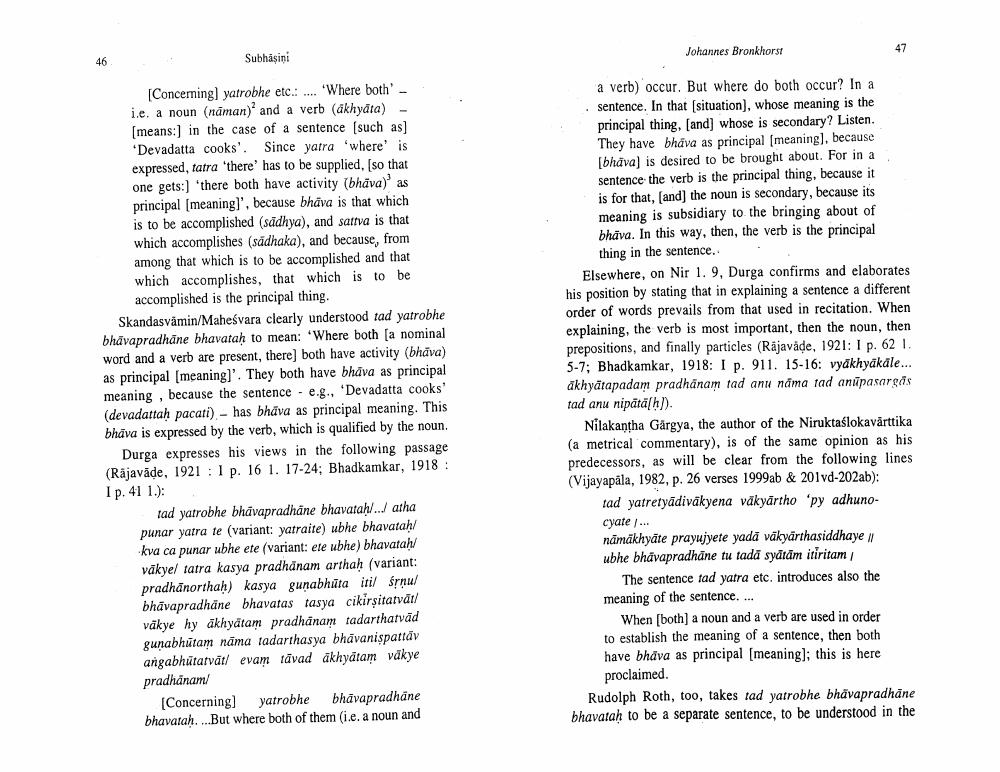Book Title: Yaska And Sentence Beginning Ofsabdabodha Author(s): Johannes Bronkhorst Publisher: Johannes Bronkhorst View full book textPage 2
________________ 46 Subhaşini Johannes Bronkhorst [Concering) yatrobhe etc.: .... 'Where both - i.e. a noun (naman) and a verb (akhyāta) - (means:) in the case of a sentence (such as) 'Devadatta cooks'. Since yatra 'where is expressed, tatra there has to be supplied, so that one gets:) 'there both have activity (bhava) as principal (meaning!', because bhāva is that which is to be accomplished (sādhya), and sattva is that which accomplishes (sādhaka), and because, from among that which is to be accomplished and that which accomplishes, that which is to be accomplished is the principal thing. Skandasvamin/Maheśvara clearly understood tad yatrobhe bhävapradhäne bhavatah to mean: 'Where both [a nominal word and a verb are present, there) both have activity (bhava) as principal (meaning]'. They both have bhava as principal meaning, because the sentence - e... 'Devadatta cooks' (devadattah pacati) - has bhāva as principal meaning. This bhava is expressed by the verb, which is qualified by the noun. Durga expresses his views in the following passage (Rajavāde, 1921 : 1 p.16 1. 17-24; Bhadkamkar, 1918 : I p. 41 1.): tad yatrobhe bhāvapradhane bhavatah/../ atha punar yatra te (variant: yatraite) ubhe bhavatah/ kva ca punar ubhe ete (variant: ete ubhe) bhavatah/ vakyel tatra kasya pradhanam arthah (variant: pradhānorthah) kasya gunabhita iti śrnul bhävapradhane bhavatas tasya cikirşitatvät/ vakye hy akhyātam pradhanam tadarthatvad gunabhūtam näma tadarthasya bhavanispattav angabhūtatvāt/ evam tāvad akhyātam vākye pradhanam/ (Concerning) yatrobhe bhāvapradhane bhavatah. ...But where both of them (ie. a noun and a verb) occur. But where do both occur? In a sentence. In that (situation), whose meaning is the principal thing, (and) whose is secondary? Listen They have bhava as principal (meaning), because [bhava) is desired to be brought about. For in a sentence the verb is the principal thing, because it is for that, (and) the noun is secondary, because its meaning is subsidiary to the bringing about of bhāva. In this way, then, the verb is the principal thing in the sentence. Elsewhere, on Nir 1. 9, Durga confirms and elaborates his position by stating that in explaining a sentence a different order of words prevails from that used in recitation. When explaining, the verb is most important, then the noun, then prepositions, and finally particles (Rajavade, 1921: I p. 62 I. 5-7; Bhadkamkar, 1918: I p. 911. 15-16: vyakhyakále... akhyātapadam pradhanam tad anu nama tad anūpasargas tad anu nipātā[h]). Nilakantha Gårgya, the author of the Niruktaślokavårttika (a metrical commentary), is of the same opinion as his predecessors, as will be clear from the following lines (Vijayapāla, 1982, p. 26 verses 1999ab & 201vd-202ab): tad yatretyadiväkyena vākyartho 'py adhunocyate .... nāmākhyāte prayujyete yadā vākyarthasiddhaye il ubhe bhāvapradhāne tu tadā syātām itiritam The sentence fad yatra etc. introduces also the meaning of the sentence. ... When [both) a noun and a verb are used in order to establish the meaning of a sentence, then both have bhäva as principal (meaning); this is here proclaimed. Rudolph Roth, too, takes tad yatrobhe bhävapradhane bhavatah to be a separate sentence, to be understood in thePage Navigation
1 2 3 4 5 6 7 8 9 10
